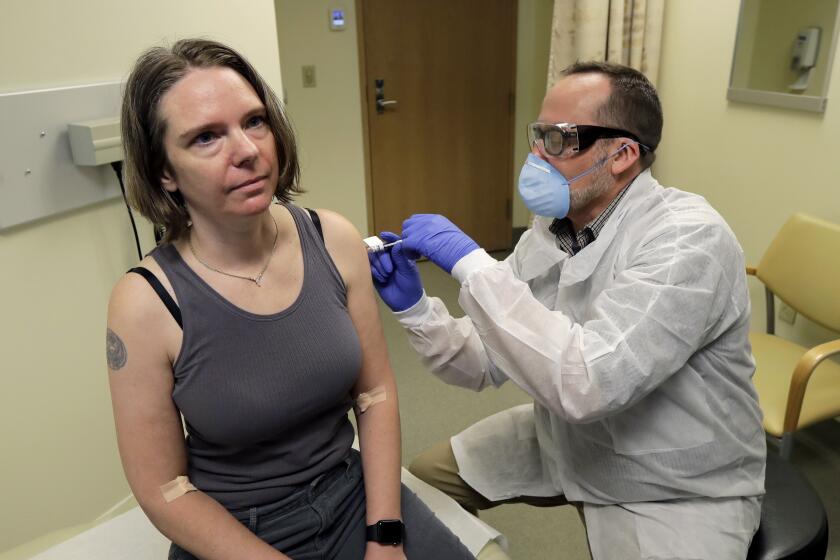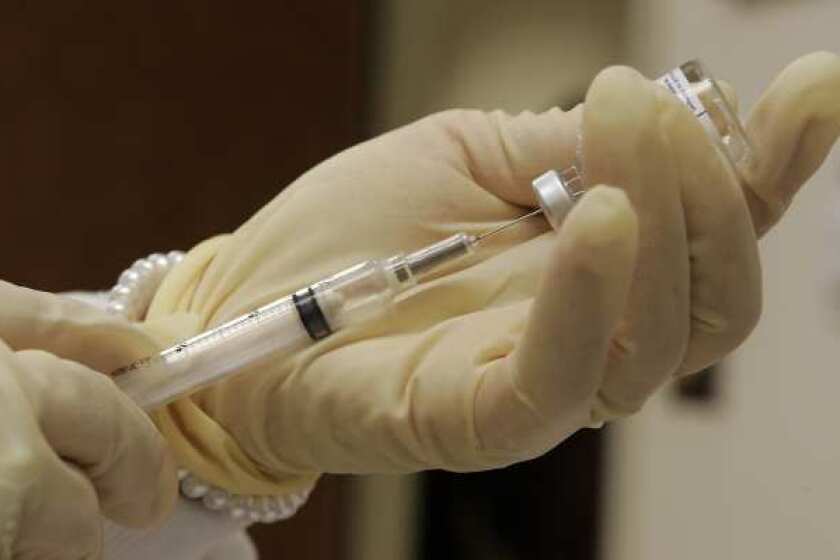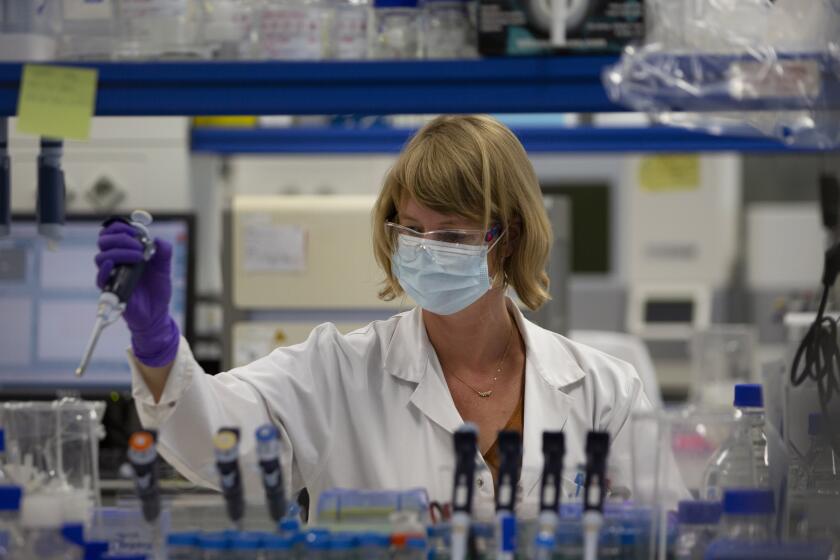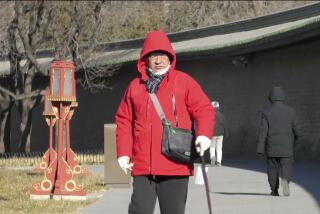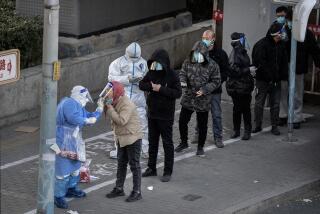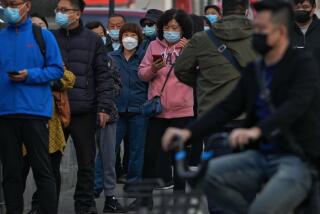Chinese firm says it has tested a COVID-19 vaccine on its own workers, without official permission
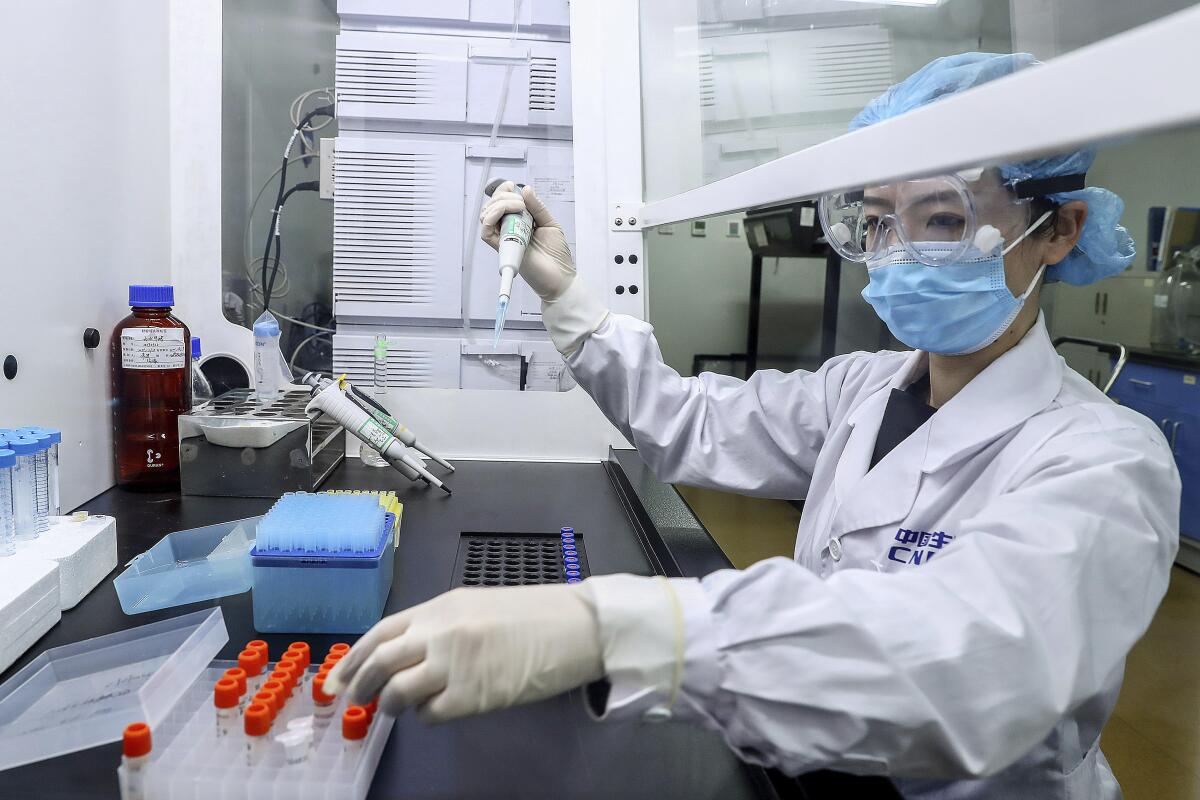
- Share via
BEIJING — In the global race to make a coronavirus vaccine, a state-owned Chinese company is boasting that it has tested its prototype on its own employees, including top executives, before the government approved testing in people.
“Giving a helping hand in forging the sword of victory,” reads an online post from SinoPharm, alongside photos of workers who it says helped “pre-test” its vaccine.
Whether it’s viewed as heroic sacrifice or a violation of international ethical norms, the claim underscores the enormous stakes as China competes with U.S. and British companies to be the first with a vaccine to help end the pandemic — a feat that would be both a scientific and political triumph.
“Getting a COVID-19 vaccine is the new Holy Grail,” said Lawrence Gostin, a global public health law expert at Georgetown University. “The political competition to be the first is no less consequential than the race for the moon between the United States and Russia.”
China has positioned itself to be a strong contender. Eight of the nearly two dozen potential vaccines in various stages of human testing worldwide are from China, the most of any country. And SinoPharm and another Chinese company already have announced they’re entering final testing.
Both China and SinoPharm have invested heavily in a tried-and-true technology: an “inactivated” vaccine made by growing the whole virus in a lab and then killing it, which is how polio shots are made. Leading Western competitors use newer, less proven technology to target the “spike” protein that coats the virus.
Results from the Phase 1 clinical trial of Moderna’s coronavirus vaccine show it’s on the right track, though there were serious side effects at high doses.
That protein is “a good place to make our bet,” Dr. Gary Nabel, chief scientific officer of the French pharmaceutical company Sanofi, said at a U.S. biotechnology industry meeting. But “it’s good to have some diversity. I like the fact that there is an inactivated, whole vaccine. That provides an alternative in case one of these should fail.”
SinoPharm’s claim that 30 “special volunteers” rolled up their sleeves even before the company got permission for its initial human study raises ethical concerns among Western observers. The company’s post cites a “spirit of sacrifice” and shows seven men in suits and ties — a mix of scientists, businessmen and one Communist Party official with a background in military propaganda.
“The idea of people willing to sacrifice themselves ... is pretty much expected in China,” said Yanzhong Huang, a global health expert at the Council on Foreign Relations, a U.S. nonprofit organization.
But with corporate and government officials getting vaccinated, other employees “might feel pressure to participate. That would violate the voluntary principle” that is a bedrock of modern medical ethics, Huang said.
U.S. preparedness for a COVID-19 vaccine rests heavily on medical supply companies with little track record of fulfilling government orders of that size.
The first round of human testing, a Phase 1 trial, requires permission from a country’s drug regulators, who decide whether there is enough laboratory and animal evidence to justify the attempt.
SinoPharm, which declined to comment for this story, is testing two vaccine candidates that received government permission for Phase 1 trials in mid- to late April. In a post on its subsidiary’s official WeChat account, the company says it conducted its “pre-test” at the end of March “to make the vaccines hit the market as early as possible.”
It would not be the only shortcut China is taking. In late June, the government gave special approval for the military to use an experimental vaccine made by another company, CanSino Biologics, skipping the final testing needed to prove if it really works. CanSino now says it’s in talks with four other countries about doing that research.
Some participants in the first CanSino clinical trial in March said in social media posts that researchers on the project claimed they had been injected Feb. 29, before regulators gave the study the go-ahead. A researcher said team leader Chen Wei, a renowned military virologist, was the first to receive the experimental vaccine, one of the participants told state-owned Beijing News.
Rich countries are placing advance orders for the inevitably limited supply of vaccine to guarantee their citizens are immunized first.
CanSino and Chen’s Academy of Military Medical Sciences turned down requests for information and interviews. The National Medical Products Administration, which approves vaccine trials, also declined to comment.
In May, a Russian scientist told the RIA Novosti news agency that he and fellow researchers also had vaccinated themselves ahead of approved studies. “It’s self-defense in order for us to continue working” on a vaccine, said Alexander Gintsburg of the Moscow-based Gamaleya research institute.
“Everyone is alive and well and cheerful,” he added.
Russia’s own Assn. of Clinical Research Organizations condemned the action as a “crude violation of the very foundations of clinical research, Russian law and universally accepted international regulations.” But about a month later, Russia launched its first vaccine study, using the Gamaleya product.
Breaking News
Get breaking news, investigations, analysis and more signature journalism from the Los Angeles Times in your inbox.
You may occasionally receive promotional content from the Los Angeles Times.
With a COVID-19 vaccine, national pride is at stake. Chinese President Xi Jinping pledged that any Chinese-made vaccine would be a “global public good.”
All this is taking place as China strives to overcome years of drug scandals — the latest coming in 2018 when authorities recalled a rabies vaccine and later announced that batches of children’s DPT vaccines, for diphtheria, pertussis and tetanus, were ineffective.
Modern international ethics require participants in medical research to be fully informed and to freely consent. In the U.S., studies involving people must receive approval from an “investigational review board,” and most U.S. research institutions explicitly state that there is no exception to board approval for self-experimenting.
“Employees may not be the best volunteers because employees are in a relationship which is not equal,” said Dr. Derrick Au, bioethics director at the Chinese University of Hong Kong.
Still, he said questions about China’s medical ethics might disappear if one of its COVID-19 vaccines ultimately proves to work. “It’s difficult to argue against success,” Au said.
More to Read
Sign up for Essential California
The most important California stories and recommendations in your inbox every morning.
You may occasionally receive promotional content from the Los Angeles Times.
